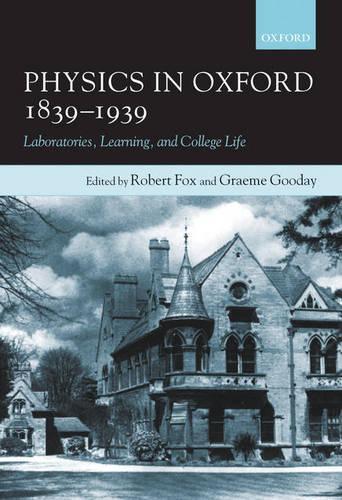Overview
Physics in Oxford, 1839-1939 offers a challenging new interpretation of pre-war physics at the University of Oxford, which was far more dynamic than most historians and physicists have been prepared to believe. It explains, on the one hand, how attempts to develop the University's Clarendon Laboratory by Robert Clifton, Professor of Experimental Philosophy from 1865 to 1915, were thwarted by academic politics and funding problems, and latterly by Clifton's idiosyncratic concern with precision instrumentation. Conversely, by examining in detail the work of college fellows and their laboratories, the book reconstructs the decentralized environment that allowed physics to enter on a period of conspicuous vigour in the late nineteenth and early twentieth centuries, especially at the characteristically Oxonian intersections between physics, physical chemistry, mechanics, and mathematics. Whereas histories of Cambridge physics have tended to focus on the self-sustaining culture of the Cavendish Laboratory, it was Oxford's college-trained physicists who enabled the discipline to flourish in due course in university as well as college facilities, notably under the newly appointed professors, J. S. E. Townsend from 1900 and F. A. Lindemann from 1919. This broader perspective allows us to understand better the vitality with which physicists in Oxford responded to the demands of wartime research on radar and techniques relevant to atomic weapons and laid the foundations for the dramatic post-war expansion in teaching and research that has endowed Oxford with one of the largest and most dynamic schools of physics in the world.
Full Product Details
Author: Robert Fox (Modern History Faculty, University of Oxford, UK) ,
Graeme Gooday (School of Philosophy, University of Leeds, UK)
Publisher: Oxford University Press
Imprint: Oxford University Press
Dimensions:
Width: 17.80cm
, Height: 2.50cm
, Length: 25.40cm
Weight: 0.949kg
ISBN: 9780198567929
ISBN 10: 0198567928
Pages: 386
Publication Date: 16 June 2005
Audience:
Professional and scholarly
,
Professional & Vocational
Format: Hardback
Publisher's Status: Active
Availability: To order

Stock availability from the supplier is unknown. We will order it for you and ship this item to you once it is received by us.
Reviews
<br> This text emerged from the much larger project that culminated with the 2000 publication of the last of the eight volumes of The History of the University of Oxford. Six academic historians-five British and one French-collaborated over a period of 12-plus years to produce this text tracing the development of physics in Oxford from the mid-19th century, when the University appointed Robert Walker to its readership in experimental philosophy, until the beginning of the Second World War a century later. Through its emphasis on the dispersed physical locations and diverse disciplinary settings for physics at Oxford during that time, the text demonstrates that physics at the University was far more dynamic than most historians and physicists have tended to believe. --SciTech Book News<br>
This text emerged from the much larger project that culminated with the 2000 publication of the last of the eight volumes of The History of the University of Oxford. Six academic historians-five British and one French-collaborated over a period of 12-plus years to produce this text tracing the development of physics in Oxford from the mid-19th century, when the University appointed Robert Walker to its readership in experimental philosophy, until the beginning of the Second World War a century later. Through its emphasis on the dispersed physical locations and diverse disciplinary settings for physics at Oxford during that time, the text demonstrates that physics at the University was far more dynamic than most historians and physicists have tended to believe. --SciTech Book News<br>
This text emerged from the much larger project that culminated with the 2000 publication of the last of the eight volumes of The History of the University of Oxford. Six academic historians-five British and one French-collaborated over a period of 12-plus years to produce this text tracing the development of physics in Oxford from the mid-19th century, when the University appointed Robert Walker to its readership in experimental philosophy, until the beginning of the Second World War a century later. Through its emphasis on the dispersed physical locations and diverse disciplinary settings for physics at Oxford during that time, the text demonstrates that physics at the University was far more dynamic than most historians and physicists have tended to believe. --SciTech Book News
Author Information
Robert Fox is Professor of the History of Science at the University of Oxford, UK. Graeme Gooday is Senior Lecturer in History and Philosophy of Science at the University of Leeds, UK.



